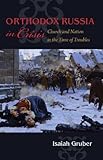Orthodox Russia in Crisis : Church and Nation in the Time of Troubles / Isaiah Gruber.
Material type: TextSeries: NIU Series in Orthodox Christian StudiesPublisher: Ithaca, NY : Cornell University Press, [2021]Copyright date: ©2012Description: 1 online resource (311 p.) : 10 halftonesContent type:
TextSeries: NIU Series in Orthodox Christian StudiesPublisher: Ithaca, NY : Cornell University Press, [2021]Copyright date: ©2012Description: 1 online resource (311 p.) : 10 halftonesContent type: - 9781501757389
- Church and state -- Russia -- History -- 17th century
- Orthodox Eastern monasteries -- Economic aspects -- Russia -- History -- 17th century
- History
- Religious Studies
- Soviet & East European History
- RELIGION / Christianity / Orthodox
- Orthodox Church ideologues, Russian spiritual life, post-Soviet religion in Russia
- 281.9/47 23
- BX490
- online - DeGruyter
| Item type | Current library | Call number | URL | Status | Notes | Barcode | |
|---|---|---|---|---|---|---|---|
 eBook
eBook
|
Biblioteca "Angelicum" Pont. Univ. S.Tommaso d'Aquino Nuvola online | online - DeGruyter (Browse shelf(Opens below)) | Online access | Not for loan (Accesso limitato) | Accesso per gli utenti autorizzati / Access for authorized users | (dgr)9781501757389 |
Browsing Biblioteca "Angelicum" Pont. Univ. S.Tommaso d'Aquino shelves, Shelving location: Nuvola online Close shelf browser (Hides shelf browser)

|

|

|

|

|

|

|
||
| online - DeGruyter On the Landing : Stories by Yenta Mash / | online - DeGruyter On the Periphery of Europe, 1762–1825 : The Self-Invention of the Russian Elite / | online - DeGruyter Orphans / | online - DeGruyter Orthodox Russia in Crisis : Church and Nation in the Time of Troubles / | online - DeGruyter Parading Patriotism : Independence Day Celebrations in the Urban Midwest, 1826–1876 / | online - DeGruyter Poland : The First Thousand Years / | online - DeGruyter Politics as Usual : Thomas Dewey, Franklin Roosevelt, and the Wartime Presidential campaign of 1944 / |
Frontmatter -- Contents -- List of Illustrations and Tables -- Preface -- Introduction Troubles, Then and Now -- 1. Russia as "Israel" The Muscovite Church-State -- 2. Profit and Piety Russian Orthodox Monasteries as Economic Corporations -- 3. Vox Dei, Vox Populi, and Vox Feminae Delaying the Crisis of Legitimacy in 1598 -- 4. In Hunger and Pain The Response of the Church to Famine and Civil Warfare -- 5. A House Divided Russian Orthodoxy under Vasilii IV and Dmitrii II -- 6. Death and Resurrection The Apex and End of the Smuta -- 7. In Retrospect Russian Orthodoxy in the Time ofTroubles and Beyond -- Notes -- Bibliography -- Index
restricted access online access with authorization star
http://purl.org/coar/access_right/c_16ec
A pivotal period in Russian history, the Time of Troubles in the early seventeenth century has taken on new resonance in the country's post-Soviet search for new national narratives. The historical role of the Orthodox Church has emerged as a key theme in contemporary remembrances of this time—but what precisely was that role?The first comprehensive study of the Church during the Troubles, Orthodox Russia in Crisis reconstructs this tumultuous time, offering new interpretations of familiar episodes while delving deep into the archives to uncover a much fuller picture of the era. Analyzing these sources, Isaiah Gruber argues that the business activity of monasteries played a significant role in the origins and course of the Troubles and that frequent changes in power forced Church ideologues to innovate politically, for example inventing new justifications for power to be granted to the people and to royal women. These new ideas, Gruber contends, ultimately helped bring about a new age in Russian spiritual life and a crystallization of the national mentality.
Mode of access: Internet via World Wide Web.
In English.
Description based on online resource; title from PDF title page (publisher's Web site, viewed 02. Mrz 2022)


